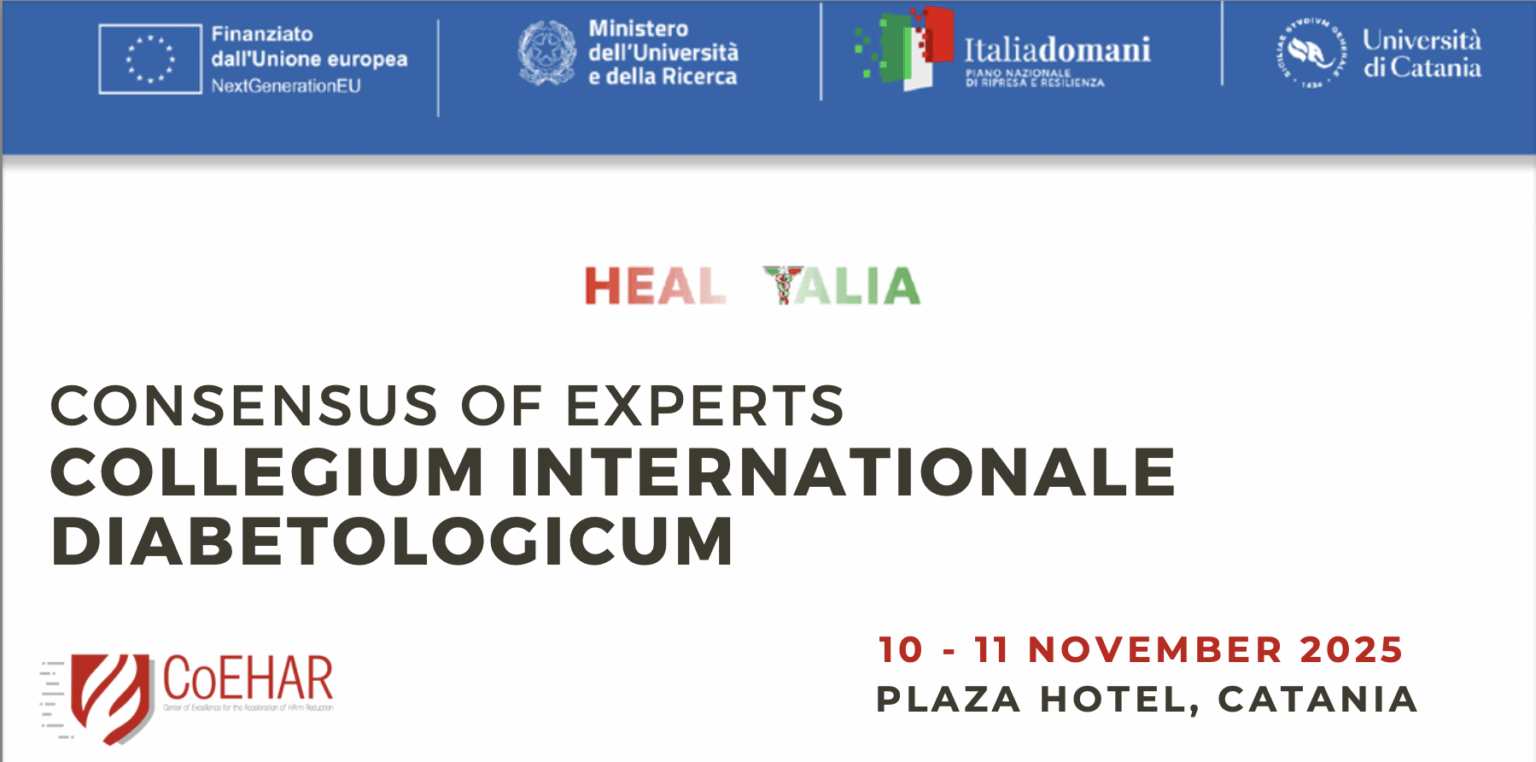On November 10 and 11, 2025, Catania will become a key meeting point for the international scientific community with the International Diabetology Collegium, dedicated to the application of the Delphi method in research on smoking harm reduction among patients with type 2 diabetes.
The event, organized within the framework of the PNRR HEAL Italia — funded by the European Union and the Italian Ministry of University and Research — in collaboration with CoEHAR (Center of Excellence for the Acceleration of Harm Reduction at the University of Catania), marks a decisive step toward building international consensus on the most effective strategies to help diabetic patients quit smoking.
Still relatively new in the scientific field, the Delphi method is a qualitative research technique designed to gather and harmonize expert opinions on a specific topic to reach a shared consensus on practical recommendations.
During the two-day Collegium, researchers, clinicians, and specialists will engage in interactive sessions and thematic workshops to identify the psychological, cultural, and clinical barriers that hinder smoking cessation and to assess the effectiveness of current cessation strategies.
The discussions will be led by Prof. Riccardo Polosa, founder of CoEHAR and professor at the University of Catania, who will coordinate the proceedings together with the CoEHAR team and AIM Education. At the conclusion of the meeting, the group will draft an international consensus document aimed at guiding future public health policies and clinical practices for smokers with type 2 diabetes.
During the closed-door session of the Delphi Meeting in Catania — held at the Plaza Hotel, both in person and via live streaming — 36 international experts in diabetology, public health, and smoking harm reduction from universities and research centers around the world will convene.
Among the participants:
Yusuff Adebisi, Bader Almustafa (Saudi Arabia), Abdul Basit (Pakistan), Tadej Battelino (Slovenia), Raffaella Buzzetti (Italy), Rossella Cannarella (Italy), Giulio Cantone (Italy), Roger Chen (Australia), Konstantinos Farsalinos (Greece), Mohamed Hassanein (United Arab Emirates), Muhammad Yazid Jalaludin (Malaysia), Linong Ji (China), Jackie Kassouf, Giusy La Rosa (Italy), Yong-Ho Lee, Lee-Ling Lim (Malaysia), Ronald Ma (Hong Kong), Dianna Magliano (Australia), Bien Matawaran (Philippines), Anoop Misra (India), Joanna Mitri (USA), Othmar Moser (Netherlands), Aliya Naheed (Bangladesh), Andrew Reynolds (New Zealand), Yoshifumi Saisho (Japan), Giorgio Sesti (Italy), Pankaj Sharma (United Kingdom), Apostolos Tsapas (Greece), Vijay Viswanathan (India), Massimo Volpe (Italy), Magda Walicka (Poland), Valentino Cherubini (Italy), Rachel Ashton, Alison Martin, and Jacob George (USA).
The New DiaSmokeFree Guidelines
The reflections emerging from the Collegium build on the work of the DiaSmokeFree Working Group, which recently developed the Guidelines for Smoking Cessation in Type 2 Diabetes.
According to the collected evidence, patients with type 2 diabetes who smoke face an increased risk of vascular diseases, poor glycemic control, complications, and premature death. Smoking cessation leads to significant improvements in quality of life and clinical outcomes, particularly by reducing cardiovascular and microvascular risks. The guidelines provide practical recommendations to integrate smoking cessation into diabetes management, addressing the psychological and organizational barriers that often prevent clinicians from providing adequate support.
Since quitting smoking can affect the metabolism of certain medications, the guidelines recommend close monitoring of blood glucose, blood pressure, and body weight in the first weeks after cessation. Emerging strategies include the use of digital tools—not only nicotine-delivery devices without combustion but also apps, wearable technologies, and remote monitoring systems—to provide continuous support beyond clinical settings. Although specific studies on diabetic patients are still lacking, these approaches represent a promising frontier for personalized and enhanced interventions.
Collegium Program
Monday, November 10, 2025
- 10:00–13:00 – Interactive expert sessions and workshops (Plaza Hotel, Catania)
- 15:30–18:30 – Public seminar open to general audiences
Tuesday, November 11, 2025
- 10:00–13:00 – Final sessions and drafting of the consensus document, coordinated by the CoEHAR and AIM Education teams
The Catania Collegium will provide an opportunity to unite the latest scientific evidence with clinical practice, promoting a new paradigm for the integrated management of smokers with type 2 diabetes. The recommendations that emerge will help improve public health policies and strengthen prevention efforts, bringing tangible benefits to millions of patients worldwide.

